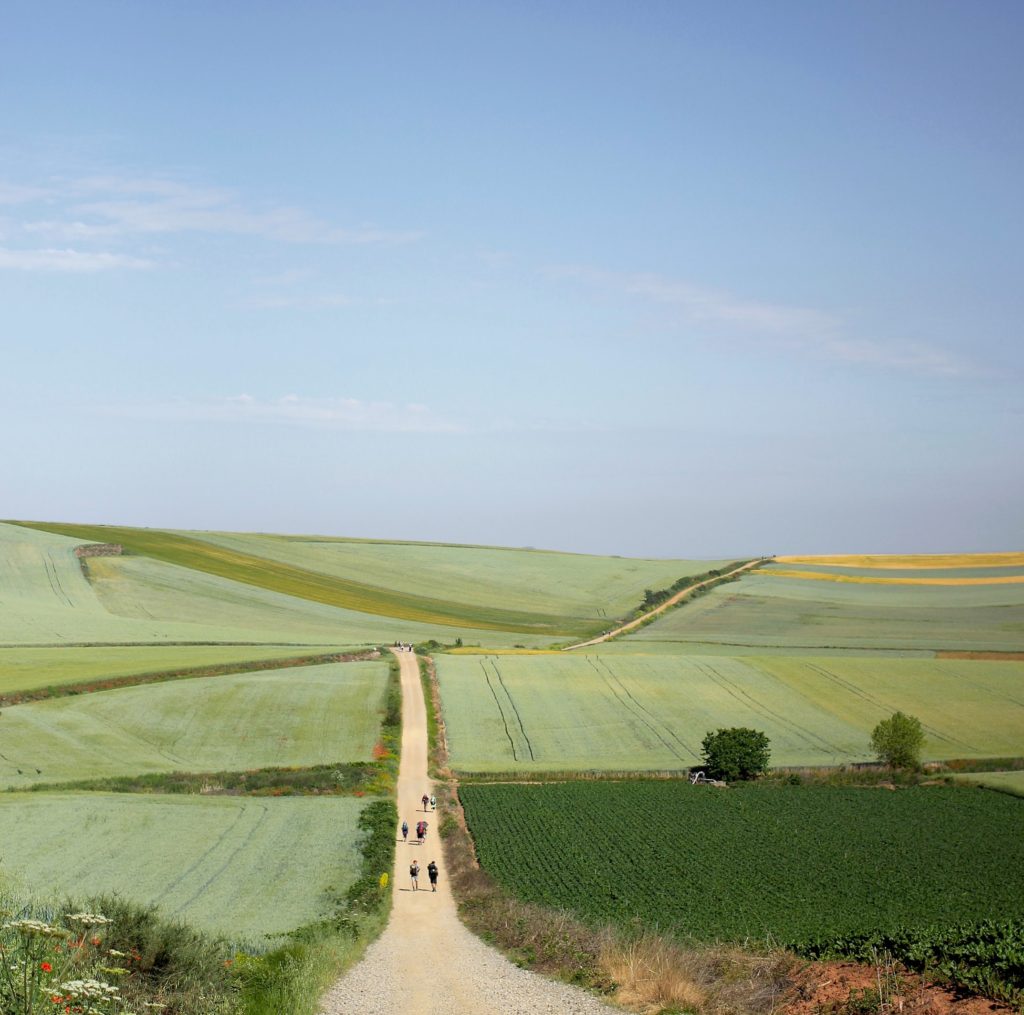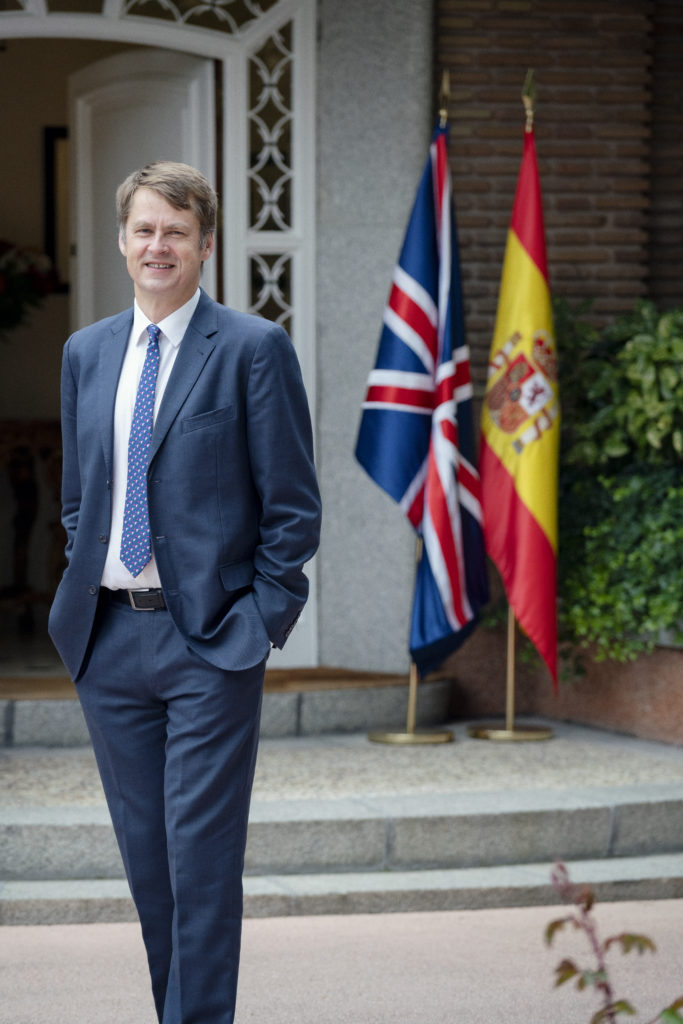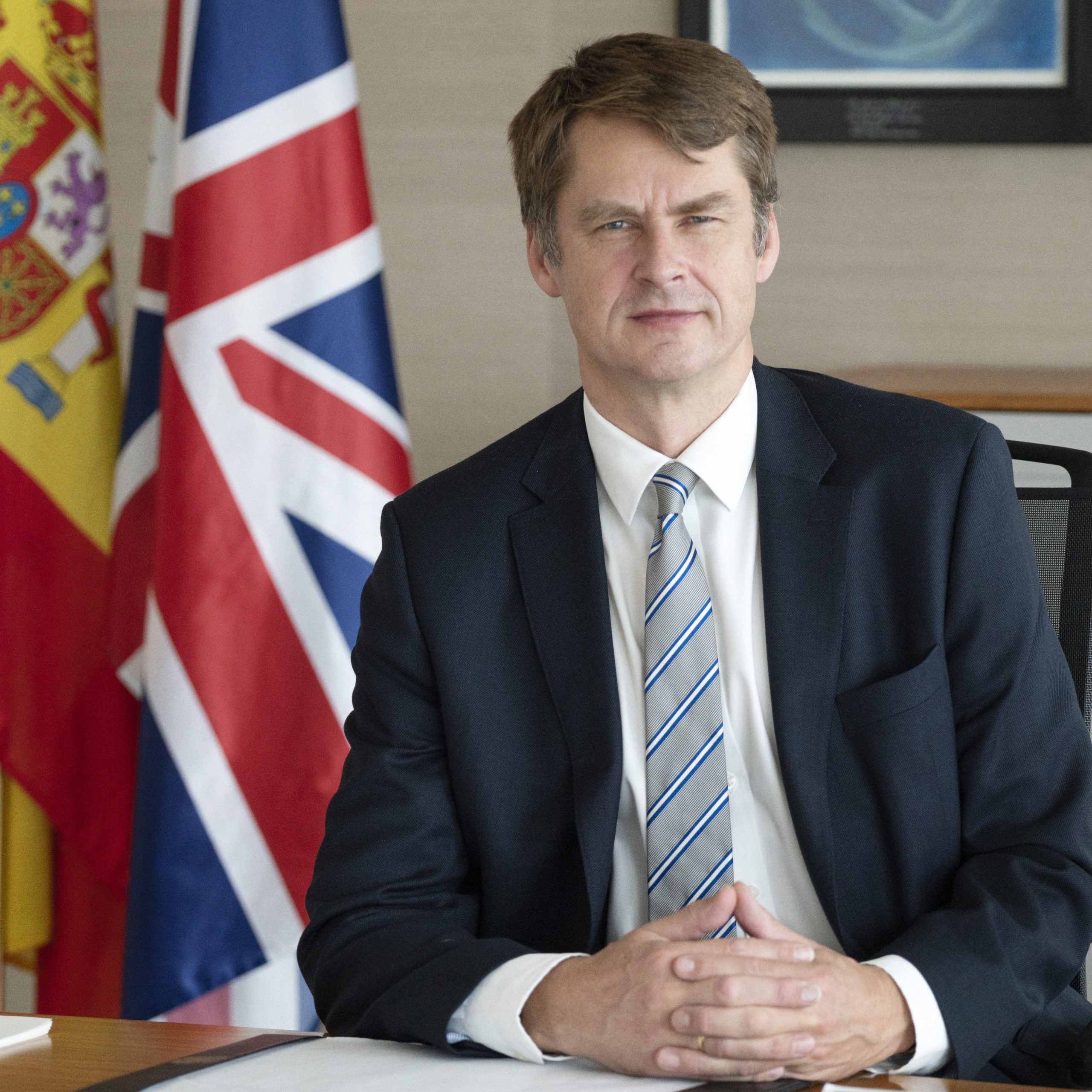FHB Interview with HE HUGH ELLIOTT, Ambassador of the United Kingdom to Spain, Honorary President of the Fundación Hispano Británica
At 19 years old, and after only two years of studying Spanish, Hugh Elliott decided to embark on a trip to Spain, it would be his first visit to our country. Several reasons led him almost spontaneously to follow one of the most popular routes of “el Camino de Santiago”, entering a very different Spain from the one today, without technology, no phones, where “people talked to people.”
About the Spanish, he says, he was surprised by their generosity and about “el Camino”, the mystery that surrounds it. In his logbook he wrote “few things” and varied, from his purpose of learning to cook “ensaladilla rusa” or how Santiago de Compostela impacted him. He tells us that recovering these notes makes him feel a little nostalgic.
Concerning the future of tourism, he wish the conditions to resume the number of British visitors in 2019, but always prioritizing sanitary criteria and safety.
EUGENIA GUTIÉRREZ
Madrid, June 2020
In 1984 you took your bicycle and your backpack and decided to do the Camino de Santiago from Great Britain. What motivated you? How did you hear about it?
As is often the case, explanations are relatively banal and circumstantial and less intellectual or inspiring. My grandfather gave me a bicycle a few years earlier, I was only 19 years old, and I thought if I have a good bike… why not “take it for a ride”?
It also influenced that I obteined a place at Trinity College in Cambridge to study Spanish. I was also doing a “gap year” but I had not yet visited Spain. I had only studied Spanish for two years at school and I really wanted to know Spain so it seemed like a great idea.
I don’t quite remember the reason why I decided to do el Camino, since it was 36 years ago and I was very young. The memories that I have now are a mixture of personal memories, that over time we can even recreate, and an old agenda where I wrote down some things but few things.
So that a number of circumstances contributed to me finally enjoying an unforgettable trip.
You did el Camino from Burgos and arrived in Compostela but you started in France.
Yes, I was precisely in France for a clear motivation, I was going to study French and Spanish at the University in the United Kingdom. So following el Camino Francés was very logical but the combination of a series of factors such as the weather and various unforeseen events deviated me from the initial path. Originally I wanted to enter from France through Roncesvalles but I ran out of time to do it and I had to take a train to Burgos where el Camino would start although I also did it later than I thought.
Due to the history that half of Spain already knows, the bicycle took 5 days to arrive in Burgos, so I had 5 days less travel than I expected and had to return to the UK because the University was starting.
What surprised you the most when you arrived in Spain? Do you remember any smell, landscape, city…? What was your impression of the Spanish people?
I thought the Spanish were very welcoming. After my experience in Burgos, because it was unusual for someone to host you for 5 days without knowing you, it was an extraordinary experience. And every day it was renewed because every day I went to Renfe to look for the bicycle (without success) and they kept welcoming me.
And then I remember that the food surprised me, I wrote down in my agenda that I liked Spanish food and in fact I had to learn how to cook “ensaladilla rusa”. Also the state of the roads, I found them very bad, I remember having problems with the wheels of the bicycle.
Simple prints I guess. I also remember the breadth of the land. My first experience was the roads of Castilla because Castilla is wide and wider by bicycle .

Language opens doors for us to get to know people better, their culture and their customs. How was the communication of an Englishman in Spain?
The truth is, I don’t remember it being a problem. Maybe I was not ashamed, when we get older that shame arises, but at that time I had no problem letting myself speak. Surely I spoke it badly, and although grammatically I had good training, I had only studied two years of Spanish. In the face of need I made myself understood.
At that time, you couldn’t use the phone, you talked to people, it was the only way to find your life. Reflecting today on the experience of el Camino and rereading the notes from then, I have felt a little nostalgic when remembering that closest form of communication.
According to the latest data from 2019, a minority of pilgrims, 5,63% do el Camino by bicycle, less than 1% on horseback or sailing and the rest, 94%, on foot. I don’t know if you knew that you were a pioneer and still are. Do you think that the way to do it or doing it alone or accompanied makes a difference in this personal experience?
Inevitably yes, but I have not done it on foot, I would have to interview my son, who has done part of el Camino on foot.
The bicycle allows you to travel relatively long distances in a short time. Going 100 km is easy on a bicycle. People who don’t ride a bike sometimes think it’s harder than it is. Of course, there are more complicated days when the weather is worse .
However, I think that the difference in the experience lies, not so much in the way, bicycle or on foot, but in whether you do it alone or accompanied. Doing it alone forces you to talk much more with the people you meet, to communicate. You also spend a lot of time without company, you stay with your thoughts and this is the greatest learning, although I don’t think I thought this way when I did el Camino.
In that sense, could we talk about how el Camino helped you learn to be alone, to live with your thoughts? Would that be the greatest learning of el Camino or would you highlight any more?
The friendship, the generosity of the people you meet on el Camino. And that applies to any trip, I also experienced it in the places in France that were not strictly el Camino itself. People are very generous. We live in very difficult times, the media tell bad news and we buy them, this is what human beings are like, it is curious.
But really people are very generous. That contact with people you don’t know is an aspect that I would highlight. It is a very generous treatment as well as a lot of fun. I found a very friendly and very genuine treatment in Spain.
El Camino is an important tourist attraction for both Spaniards and foreigners. In 2019, about 348,000 pilgrims were registered, with the United Kingdom being the sixth foreign country by number of visitors. Why do you think it is so popular with foreigners and especially British people?
El Camino has become popular among foreigners and also among Britons because it has become better known, it is easier to access information, because a great deal of work has been done to promote el Camino, the routes, guides have been published, they have been produced many films, for example “El Camino” (The Way), by Martin Sheen. And perhaps it has something of a mystery, the mystery of that reflection of what one seeks on a personal level.
Santiago de Compostela is a singular, historical city. Reviewing my schedule I realize that in 1984 I really liked Santiago de Compostela. Despite seeing many tourists I had a very special “feeling”.
Its popularity has been a combination of information and good management of an increasingly numerous tourism.
And of course , there is the fact of pilgrimage itself, in addition to being one of the oldest forms of tourism.
Do you think that being a pilgrim in the 80s and today are different experiences?
Yes, the difference lies fundamentally in what I mentioned before, in technology and especially in the telephone. In the 80s, you didn’t have the option to follow the news in real time of what was happening in other parts of the world.
You could buy the newspaper, although I didn’t buy it because I didn’t have money for it. I also did not watch television or listen to the radio because I did not have access to a television or a portable radio. The most relevant difference is this aspect. Now that I remember I wouldn’t mind making an attempt to “separate from technology” in a timely manner at some point in the future.
This last question is forced by the moments that we are living. The pandemic has had a disruptive effect on our lives, governments are trying to manage this situation and we are in a moment of opening borders, what can you tell us about the opening of borders between Great Britain and Spain and how can it affect to tourism both from Spaniards going to Great Britain and vice versa?
To this day, June 20, the British Government advises against traveling abroad, they are our recommendations on the subject of the pandemic.
We know how dramatic it is for all economic sectors, we know how many people live on tourism. I have worked in tourism, I know it and I know how important it is especially in the summer.
Spain has announced that it will open its borders from June 21. The UK is behind the pandemic, it came a little later and we will leave a little later.
We all want the sector to be opened as soon as possible but above all, sanitary criteria must prevail, it must be done safely, we must go slowly, step by step.
Spain is doing a good job with the pilot test in the Balearic Islands. With good protection measures and caution will go retaking tourism, although this year will not be good, I think it’s a fact unavoidable .
We have to focus on finding the vaccine and effective treatments. The Oxford University announcement of dexamethasone, as an effective therapeutic drug in certain cases of Covid-19, has been good news. It will also have an important impact but we really have to look for the vaccine and we are focused on it. Until there is a vaccine, tourism will be somewhat reduced.
Spain is acting to control the outbreaks and its management is going to be essential so that tourists have confidence and can come safely. Spain is one of the favorite destinations for the British, last year nearly 19 million Britons came.
So in the medium term I am optimistic, in the short term I do not think it will be a good year, but our wish is that the conditions exist to resume the numbers from before but step by step and safely.


